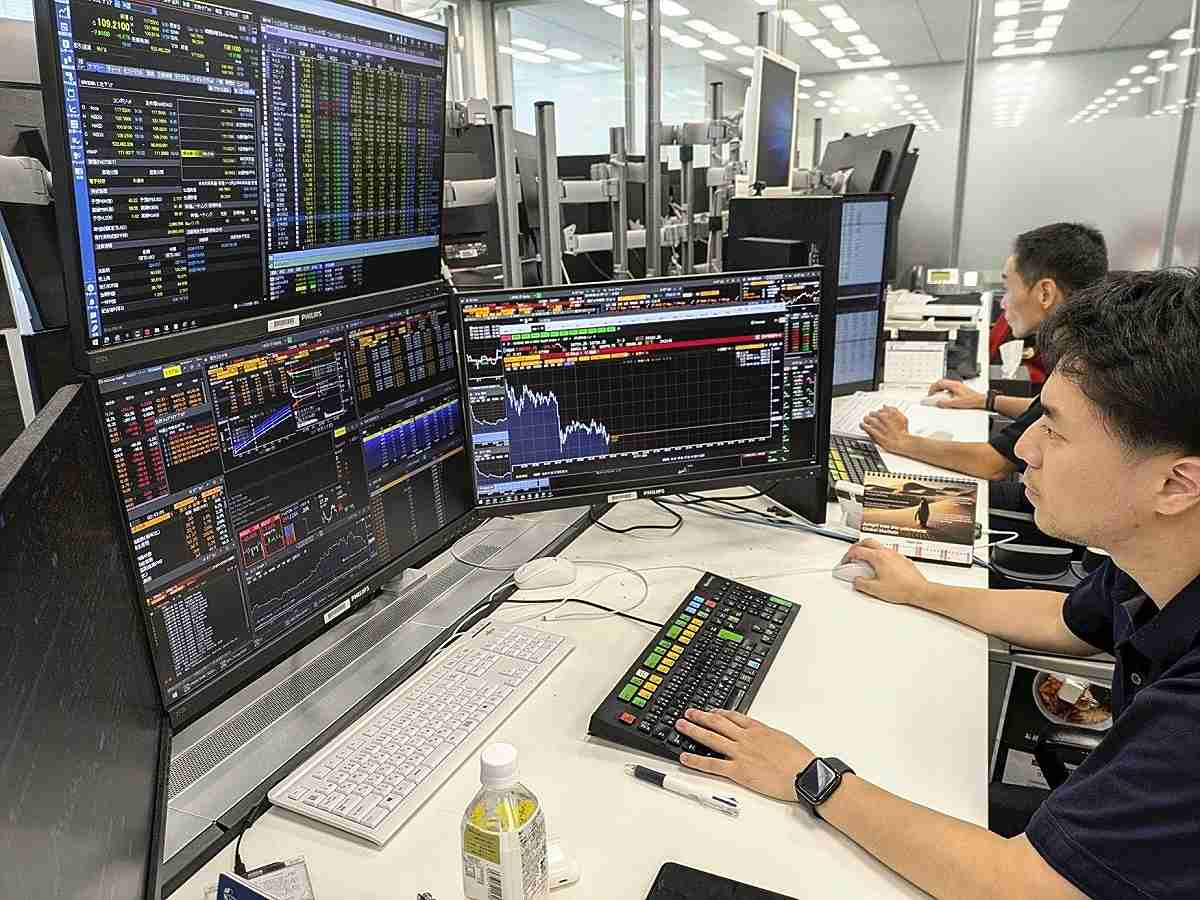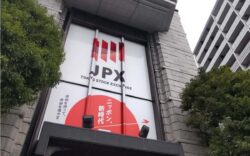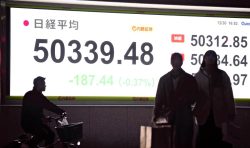
Dealers of SMBC Nikko Securities Inc. busy dealing with clients, in this photo taken in their dealing room in Chiyoda Ward, Tokyo on Friday.
20:00 JST, August 3, 2024
The Nikkei-225 Stock Average posted the second-largest daily drop in its history on the Tokyo Stock Exchange on Friday, as investor sentiment rapidly cooled with growing concerns about the U.S. economy’s prospects and wariness over the yen’s appreciation against the dollar. Volatile price moves may continue in the days ahead.
“It was a ‘falling knife’ situation, and investors had a hard time grasping it,” said Kazuhiko Sawanobori, an executive officer of SMBC Nikko Securities Inc., to The Yomiuri Shimbun. He was referring to the aphorism in the investment world, “Don’t try to catch a falling knife,” which suggests that one should not buy into a stock or other assets during a drop.
The pace of the decline was rapid. The Nikkei index opened at 9 a.m. on Friday 682 points down from Thursday’s close, and just 10 minutes later, the decline had widened to 1,500 points.
While the dealers in SMBC Nikko Securities’ dealing room were busy with clients, the index’s decline hit more than 2,000 points by around 10 a.m.
Chip-related stocks, which had led the stock market rally since the beginning of the year, fell sharply, with Tokyo Electron, a semiconductor equipment maker, falling about 12%. Stocks of Advantest, a testing equipment maker, and Softbank Group, which has a major British semiconductor design company under its wing, lost about 8% of their value, respectively. These three stocks alone led the daily benchmark index to decline by about 640 points.
To cut or not to cut
The sharp decline was triggered by two U.S. economic indicators released on Thursday. The U.S. manufacturing activity gauge for July dropped from the previous month, while the weekly initial jobless claims increased from the previous week, both worse than the market expectations, stoking concerns over the country’s economic prospects.
Federal Reserve Chair Jerome Powell on July 31 suggested that the Federal Open Market Committee (FOMC) may decide to cut interest rates at its September meeting.
However, some observers believe that “the market is becoming aware of a sense of wariness that a delay in the rate cut may cause an economic recession,” as Tomoichiro Kubota of Matsui Securities Co. put it.
The Dow Jones Industrial Average, a stock market index of 30 U.S. blue-chip companies, closed Thursday at 40,347.97, down 494.82 points from the previous day.
Chip-related stocks fell as expectations for generative AI have been dampened by the announcement by Intel, a major U.S. semiconductor company, of a plan to lay off about 15,000 people. This has spilled over into the Tokyo market.
BOJ policy
Also lying behind the plunge in the stock market is the Bank of Japan’s monetary policy. The BOJ, at its monetary policy meeting on Wednesday, decided to raise interest rates, its second hike this year, which came earlier than most in the market had expected.
BOJ Gov. Kazuo Ueda indicated the possibility of further raises to interest rates at the press conference following the meeting.
The prospects of a rate hike by the BOJ and a rate cut by the Fed incited the buying of yen, which will have a relative operational advantage, leading to the rapid appreciation of the yen against the dollar.
As a stronger yen will reduce import costs, it will also ease the currently rising prices of commodities.
On the other hand, for export-related companies such as automobile and machinery makers, their overseas earnings will be reduced when converted to yen.
On Friday, the stock price of Toyota Motor Corp. was down about 4% from the previous day, and Nissan Motor Co. was down about 7%.
Many of the companies that make up the Nikkei 225 have overseas operations as their core business, making it more likely that a strong yen will lead to stock price declines in Tokyo.
Top Articles in Business
-

Prudential Life Insurance Plans to Fully Compensate for Damages Caused by Fraudulent Actions Without Waiting for Third-Party Committee Review
-

Narita Airport, Startup in Japan Demonstrate Machine to Compress Clothes for Tourists to Prevent People from Abandoning Suitcases
-

Japan, U.S. Name 3 Inaugural Investment Projects; Reached Agreement After Considerable Difficulty
-

JR Tokai, Shizuoka Pref. Agree on Water Resources for Maglev Train Construction
-

Toyota Motor Group Firm to Sell Clean Energy Greenhouses for Strawberries
JN ACCESS RANKING
-

Japan PM Takaichi’s Cabinet Resigns en Masse
-

Japan Institute to Use Domestic Commercial Optical Lattice Clock to Set Japan Standard Time
-

Israeli Ambassador to Japan Speaks about Japan’s Role in the Reconstruction of Gaza
-

Man Infected with Measles Reportedly Dined at Restaurant in Tokyo Station
-

Videos Plagiarized, Reposted with False Subtitles Claiming ‘Ryukyu Belongs to China’; Anti-China False Information Also Posted in Japan






















